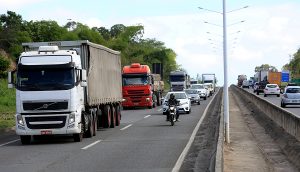Avoid Tractor-Trailer Accidents In St. Petersburg With These Tips
 Michael Babboni
Trucking Accidents
There are loads of different types of auto accidents. Sure, there are car vs. car collisions, but that's not all. For instance, motorcyclists are also sharing the roadways with everyone. All it would take is a slip-up on a rider's part for things to turn ugly in a hurry. Then again, a negligent driver could be responsible for the situation too. And what about eighteen-wheelers?
Michael Babboni
Trucking Accidents
There are loads of different types of auto accidents. Sure, there are car vs. car collisions, but that's not all. For instance, motorcyclists are also sharing the roadways with everyone. All it would take is a slip-up on a rider's part for things to turn ugly in a hurry. Then again, a negligent driver could be responsible for the situation too. And what about eighteen-wheelers?Those large trucks are on the streets and highways too. Nobody is complaining, though. These machines and their drivers are responsible for getting Floridians all the stuff they need. Not only do the operators make deliveries to homes, but they transport goods to stores. As such, their shelves stay stocked, and items remain readily available for everyone.
However, because big-rigs are so big and heavy, it isn't pretty when they hit passenger vehicles. The smaller cars are left mangled and broken. Plus, the people within them often sustain severe injuries. Obviously, ailments vary from one incident to the next, but some of the most common kinds include:
• Traumatic brain injuries
• Broken bones and fractures
• Lacerations and contusions
• Burns
• Soft tissue injuries
This bullet list is only a sample size, and there are plenty of other wounds where these came from. Hence, don't be surprised if you get into an accident and come out of it with something else. But maybe we should try something different. How about if we attempt to cut down on some of these crashes? Use these tips to stay safe on our streets and avoid accidents with big rigs.
Keep Out Of No-Zones
You've probably seen what feels like a million of those signs on the back of tractor-trailers warning people of blind spots. The sides, fronts, and backs of trucks have no-zones. If you happen to get into one, the operator won't be able to see you. Then, if he or she switches lanes, accelerates, or backs up, your vehicle could potentially get struck. So, steer clear of the blind spots/no-zones of commercial trucks, and with any luck, you won't become another accident statistic.
Don't Slam On Your Brakes
Sometimes, slamming on the brakes can't be helped. After all, if the traffic in front of you stops abruptly, what are you supposed to do? However, if you can keep from it, don't try to stomp the brake pedal through the floor when a big truck is behind you. Such vehicles need additional room to slow down and stop. In other words, they aren't your car and usually won't stop on a dime. So, ease into braking whenever possible, especially with an eighteen-wheeler behind you, and hopefully, that will ensure you remain wreck-free.
Don't Crowd A Big Rig
It is also important to give a commercial truck plenty of room to turn. These vehicles make wide right turns, as you've probably seen. Or, even if you haven't seen a turn in person, you've likely spotted a sign on the back of a trailer telling you that. Left turns aren't quite as wide, but they still require more room than, let's say, a Ford F-150. Just give tractor-trailers space, regardless of where you're at around them. By keeping your head on a swivel and giving them room, that should be enough to keep accidents at bay.
Have you been in an accident with a negligent eighteen-wheeler operator? You might have the grounds to seek compensation if that's the case. Contact our firm to schedule a free case evaluation with the St. Peter Lawyer. He'll review everything and tell you where your claim stands.
